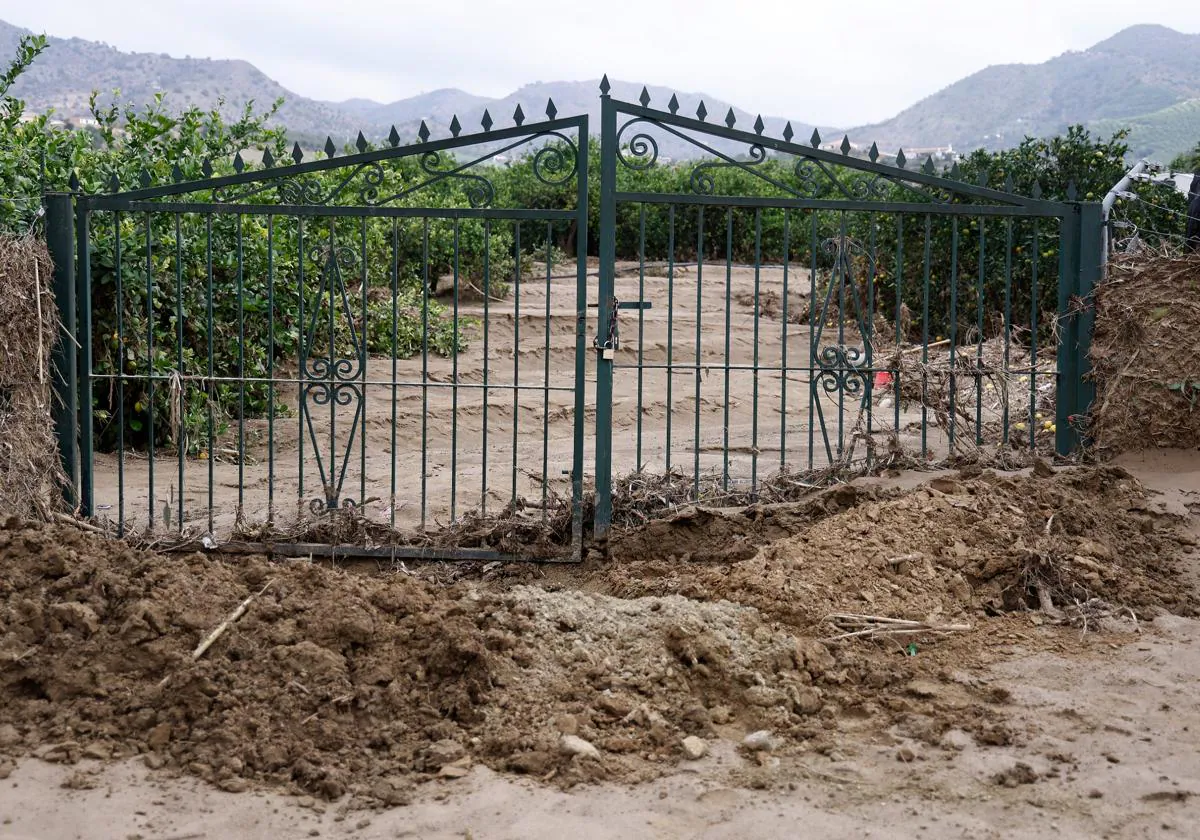

Sections
Highlight

Julio J. Portabales
Álora
Friday, 8 November 2024, 16:55
The agricultural areas of Malaga province are once again in the limelight, but this time for a different reason than a few months ago. Whereas previously there was talk of the threat of crop losses in the Guadalhorce valley area due to the prolonged drought, the concern now lies in the large amount of mud and sediment that the 'Dana' storm has left in its wake in the interior of the province. This phenomenon, far from being a blessing, could seriously affect hundreds of crops, especially in the town of Álora, where farmers are facing a situation that complicates their daily work and threatens to destroy entire harvests.
The main problem is the amount of mud that has adhered to the farms, preventing access to certain areas and complicating harvesting and maintenance tasks. The depth of the mud, together with the 'crust' effect that can form around the plants, means that the soil is sealed and does not allow the roots to breathe properly. "The problem with mud on the roots is that the plant doesn't breathe well and it needs oxygen. It has to be removed as soon as possible, because if it settles, it could cause serious damage to the plant," explained Cristóbal González, a worker from a private company who has been contracted to remove the mud with his excavator from the cultivation areas. This work is vital to avoid irreversible damage to the plants.
González also warned that this work must be done with great meticulousness and care to avoid long-term damage to the crops. "Excessive humidity creates a layer that prevents the passage of nutrients and suffocates the roots, but it is not good to trample it excessively because that can damage the plant. It is a job that must be done with precision, patience and a lot of attention to detail," he said, stressing the complexity of the situation. This work, which requires experience and technique, is essential to preserve the crops and ensure that they can recover in the shortest possible time.
While González worked on Agustín Navarro's crops, the owner observed the state of his farm with a mixture of concern and resignation. The farm, normally productive and full of life, was now showing the ravages of flooding and mud. "I'm quite inexperienced in these situations, but the older ones say that the mud has to be removed, especially around the trunk, otherwise the trees will be lost," explained Navarro, aware that any mistake could be fatal for his orchards. Uncertainty was reflected in his eyes as he watched González's machinery try to clear the land.
Worse luck has befallen Jesús Tabuada, another farmer in the lower part of La Isla, where last Tuesday's floods left so much mud and debris that it is impossible for him to access his crops. The situation is desperate, and the economic consequences are beginning to show. "I have not been able to enter, the mud is up to my waist and it is impossible to move. The situation on the farm is catastrophic; a lot of food is lost, it's a disaster," Tabuada explained, his tone reflecting the anguish in the area. The impossibility of harvesting their crops threatens to lose a whole year of work and effort.
Tabuada, visibly affected and dejected by the circumstances, added: "I have a crop of Chinese lemons that are ready to pick, but you can't access them because the mud traps you. In the end, everything is going to be lost if this continues." The magnitude of the situation goes beyond the visible damage and touches a deep emotional aspect among farmers, who see how their efforts and sacrifices could vanish in a matter of days. This situation affects not only the roots of the trees and their immediate harvests, but also the long-term stability of the land and the farmers' ability to return to normality. "I have never seen anything like this before in my life," concluded Tabuada.
The situation in the area is critical and every day that passes without a solution increases farmers' anxiety. Recovery work, although slow, is essential to try to mitigate the damage and avoid the total loss of crops. The combination of mud, stagnant water and the impossibility of access is putting a strain on a sector that had already been hit by drought and other climatic adversities.
Publicidad
Publicidad
Publicidad
Publicidad
Esta funcionalidad es exclusiva para registrados.
Reporta un error en esta noticia

Debido a un error no hemos podido dar de alta tu suscripción.
Por favor, ponte en contacto con Atención al Cliente.

¡Bienvenido a SURINENGLISH!

Tu suscripción con Google se ha realizado correctamente, pero ya tenías otra suscripción activa en SURINENGLISH.
Déjanos tus datos y nos pondremos en contacto contigo para analizar tu caso

¡Tu suscripción con Google se ha realizado correctamente!
La compra se ha asociado al siguiente email
Comentar es una ventaja exclusiva para registrados
¿Ya eres registrado?
Inicia sesiónNecesitas ser suscriptor para poder votar.